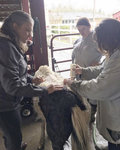

Last week, Tracy Nichols was escorted off of what was once known as NW Love All Animals Rescue in Battle Ground by the Clark County Sheriff’s Office.
Her property had been foreclosed.
Left behind were a few feral cats, chickens and a peahen the county is working to trap. For the most part though, the property is now quiet and empty — a far cry from less than a week before when more than 100 animals, ranging from horses to guinea pigs, were held there.
The process of finding homes for the animals started when KGW, a news organization out of Portland, ran a short segment about the looming closure of NW Love All Animals Rescue and the video was spread throughout the Clark County community. NW Love All Animals also gave daily updates of its impending closure through Facebook, along with pleas for financial assistance in hopes of keeping the facility open.
The video and news of the closure was met with mixed reviews. Some offered messages of support while many claimed that closing NW Love All Animals was for the best and that it had a spotty history of animal neglect.
Mostly though, people quickly jumped in and offered to take an animal — or more than one — and in less than a week’s time, most animals found new homes.
But according to the county, although registered as a nonprofit in Washington, it was never a real rescue.
“It was never a legally permitted facility,” said Paul Scarpelli, county manager of animal control and code enforcement, in an email last week.
“The property currently has liens in excess of $90,000 for lack of compliance and numerous opportunities proceed through the licensing process,” Scarpelli said.
Apparently, the facility was being fined $250 a day until last year.
“When the bank completed foreclosure last year for being in arrears to them for more than $40,000, the $250/day fine ended. The lien survived title change. We have been working with Umpqua Bank and their necessary steps of eviction ever since,” said Scarpelli.
The facility had long been a point of controversy even before its closure, with county records showing that since 2012, 34 complaints have been filed against it.
While the majority of the complaints are related to noise and animals wandering off the property, 10 complaints of cruelty were filed leading to six warnings from the county.
One area of concern surrounding the facility were the conditions the animals lived in.
Save a few patches of grass, the entirety of the property, where the animals were allowed to roam, is covered in deep mud. In some areas, it's difficult to tell where mud starts and animal feces begins.
A county report from last December says that on one occasion officials couldn’t finish an assessment because of how bad the mud was.
“The mud issues are so extreme we would have been thigh level in sticky/sucky mud” the report states.
When Stacy Lewis visited the farm days before its closure, she said it had become like “hell on earth.”
Lewis had visited the facility when her friend was donating a horse in the hopes of it finding a new home. She said at the time it was a suitable place and had green pastures for the horse.
“It was adorable,” she said.
Lewis and her friend decided to take back the 26-year-old Shetland pony when they saw the KGW segment.
When Lewis arrived to pick up the horse, she said she was “appalled.”
She said every rib was showing and the rain scalding on his back was some of the worst she’s ever seen.
“His skin is rotted off his back,” she said.
Lewis’ goal in speaking to the press and posting pictures on social media is to ensure NW Love All Animals never reopens.
“The animals need a voice,” she said. “This cannot happen again.”
A Clark County Animal and Control incident report accounts a similar situation from August 2015 involving a cat named Lucy.
Lucy had been under the care of NW Love All Animals for about a year and would be taken to visit her owner from time to time.
The report states that the owner became concerned, saying Lucy’s health was “deteriorating” and asked that Lucy be returned.
In the report, the owner says Nichols was reluctant to return the cat and when she did, it was very thin, flea infested, suffering from “extreme diarrhea” and would not eat.
After being treated, Lucy was found to have cryptosporidium, a parasite easily transferred from animal to animal and even to humans.
An official wrote in the report that after attempting multiple times to set up a time to investigate the neglect accusation, Nichols “became very hostile on the phone, said that I was not welcome on the property and not to come without a court order.”
Without access to the other animals on the farm, the source of the cryptosporidium remained unknown, the report says.
On why the county did not pursue a court order, Scarpelli said in an email “crypto is not uncommon and certainly not a crime should your animal contract it. Warrants require criminal activity to which this does not rise. Ms. Nichols was asked if any other animals were showing signs of crypto, which she indicated they were not. She was further instructed to be looking for signs and take animals to vet if observed. We understand the cat was returned to a previous owner."
Furthermore, Scarpelli said that although social media has a way of amplifying issues, the county didn’t find conditions at the facility to be unsuitable for animals leading up to the facility’s closure.
Of the horse with rain rot, Scarpelli said he too had seen the photo and there was a county officer “following leads, talking with neighbors, visiting the parents, and digging into postings all week.”
He couldn't provide any specifics on a particular photo, but said horses have been the more widely discussed.
Scarpelli said the moral of this entire ordeal should be to not take your animals “just anywhere, and if thinking about starting a rescue, that you have a dependable revenue stream about three times the size of your heart, because it is not a moneymaking proposition.”
Nichols has lived with a chronic injury she sustained in 2014, which has led her to recruit help to manage the facility. But she said there has never been a time she’s felt that she, or the property, have been unfit to care for the animals.
She feels the county and the court of public opinion have been unfair to her.
She addressed NW Love All Animals in an interview with The Reflector at the end of last week.
Of the cruelty complaints, Nichols said she was accommodating to all the county’s requests and pointed to the fact that she’s never been fined or “punished” for them.
“They were warnings — nothing more,” she said.
She also said one particular neighbor was likely responsible for most of the calls.
Nichols said she and animal control officials have a long-standing relationship and they know the standards she keeps.
Nichols said Lucy the cat’s owner has “dementia and mental issues” and couldn’t take care of the animal herself. She said she took care of the cat well and that accusations were incorrect, and she said she has always been open to owners’ requests for visits.
Of the shock surrounding the shetland pony when the photo surfaced on Facebook, Nichol said the animal was not underweight, just old, and rain rot has been a common problem among all horse owners this year because of the bad weather. She said she had done all she could to prevent it.
Additionally, she said the way the owners are treating the rain-rot will only make it worse.
“Anyone with horse knowledge knows, when dealing with rain rot, you don’t do what they did,” she said of them clipping its back before the horse was dry.
Nichols also discussed a photo of a dead goat Lewis had shared with the public along with the horse photo.
She said that it was one of their older goats and they were waiting to bury it when everyone left and it was covered in a blanket. She went on to say that someone had uncovered it and dragged it to stage an incriminating photo.
Nichol said the muddy conditions are due to stream flowing onto her property from an adjacent property and that code enforcement officials would not help her.
Then there was the question of why, after almost seven years of referring to themselves as a “rescue,” NW Love All Animals never become a registered rescue in the county.
Nichols said there was no need given the fact that she’s never taken money for services.
She argued that she was simply caring for animals the same way one might watch a friend’s pet while they’re on vacation — only with hundreds of animals including livestock in this instance.
“It would be no different if I took down the rescue signs and had a farm and said they were all my animals,” she said. “Then what’s the issue?”
Nichols said it wasn’t a problem until her neighbors began complaining.
At her previous property near Battle Ground Lake, she ran the same operation without issues, she said.
Nichols claims there are no other non-profit animal rescues in Clark County that are required to go to through a similar application process — even ones that foster.
The county disagrees. Scarpelli points to the organization’s various means of fundraising and the county code, which does not specify whether or not money changes hands.
“She was quite clearly a shelter, with the intent of care and well being for animals,” he said.
Although Nichols said she isn’t planning on opening another rescue, she is still actively working to save NW Love All Animals.
“I did everything in my power, that I could do, to save the rescue,” she said.